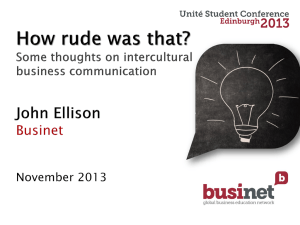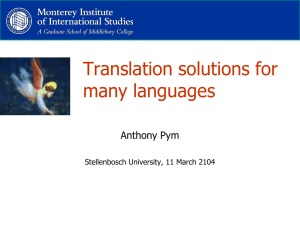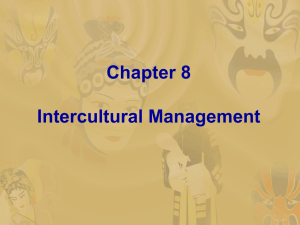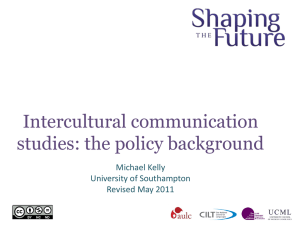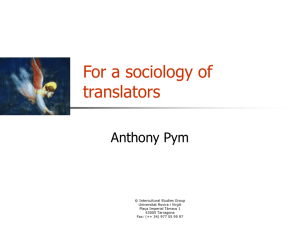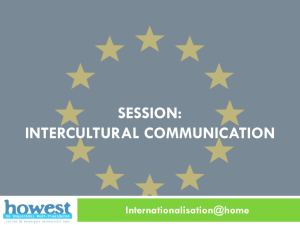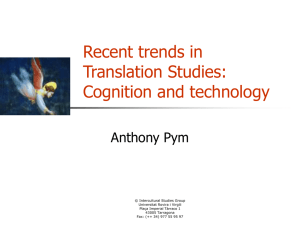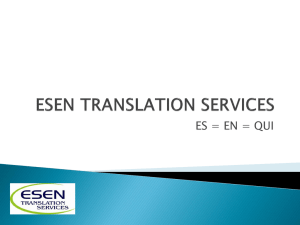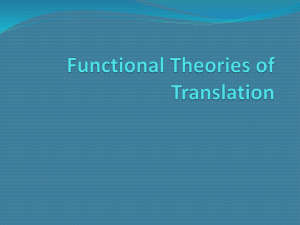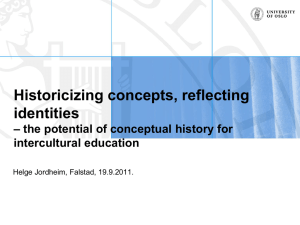What is translation?
advertisement
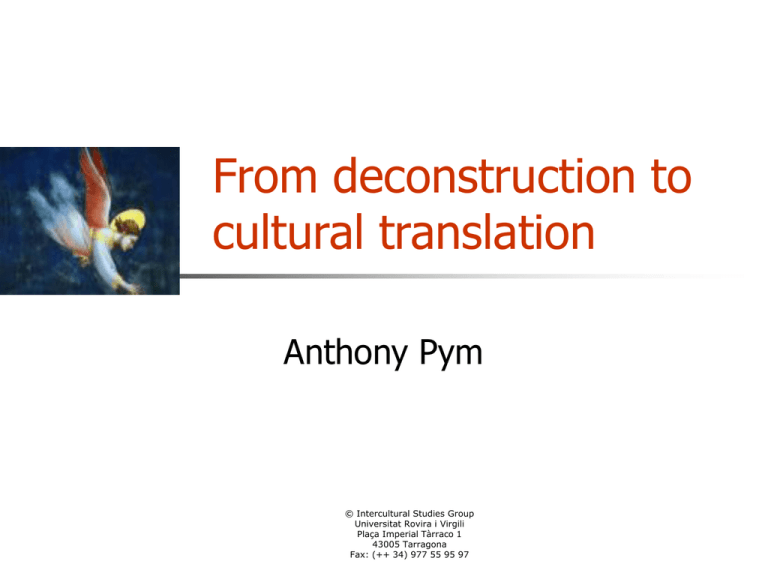
From deconstruction to cultural translation Anthony Pym © Intercultural Studies Group Universitat Rovira i Virgili Plaça Imperial Tàrraco 1 43005 Tarragona Fax: (++ 34) 977 55 95 97 Equivalence became unpopular Because it assumes repetition of function (Skopostheorie) Because it was seen to be historical (DTS) Because of epistemological skepticism (indeterminacy) © Intercultural Studies Group Heisenberg “The more precisely the position is determined, the less precisely the momentum is known in this instant, and vice versa.” (1927) The Uncertainty Principle Aka Principle of Indeterminacy. © Intercultural Studies Group Quine Gavagai = Gavagai = Gavagai = Gavagai = Rabbit Lo! A rabbit! Detachable rabbit part There is a flea on the rabbit’s left ear. © Intercultural Studies Group Indeteminacy as doubt ST1 can be rendered as TT1, TT2… TTn. There is no rule for decid¡ng between TTs. The decision process is not binary. The translation will be “right but…”. © Intercultural Studies Group Two alternatives Translations are always inadequate to their sources (“similarity” and not equivalence) (aesthetic ideologies of the transcendent source). Indeterminacy is already in the source (deconstruction). © Intercultural Studies Group Similarity as semiosis “The meaning of a sign is its translation into some further, alternative sign.” (Jakobson) Translation creates meaning. Translation creates equivalence? © Intercultural Studies Group Deconstruction Indeterminacy is at the “source”. There is no “transcendental signified”. The source is in more than one language (“plus d’une langue”). Translation means transformation. Benjamin: translations extend and add; they do not reproduce. © Intercultural Studies Group Indeterminism as complexity Texts have nodes where indeterminate decisions have to be made. (Der gute Mensch) The more such nodes, and the more indeterminate, the greater the complexity. A complicated text need not be complex. © Intercultural Studies Group Living with indeterminacy Pure belief in certainty (Bible translators) Apply norms and regulations (localization) Learn through trial and error (professionals) Show up-front peronal interpretations (Levine) Be foreignizing (Venuti). Give extensive extratextual material (Spivak). © Intercultural Studies Group For example: “Yes we can.” “Any action may result in all-out war.” © Intercultural Studies Group Deconstruction across the board: There is no source (text, culture, author). All texts and cultures are hybrid. All texts and cultures are translational. Translation always happens within and between cultural groups. Translation is always cultural translation. © Intercultural Studies Group Cultural translation The ethnographer’s description of a culture. (Asad) The languages of migration and the postcolonial third space. (Bhabha) Understanding as a constant interpretation of the other (Iser). The languages of culturally fragmented postmodern societies. (Renn) © Intercultural Studies Group Extensions…. Translation is the displacement of theory from one topographic location to another (e.g. Miller 1995). Translation is “a metaphor for understanding how the foreign and the familiar are interrelated in every form of cultural production” (Papastergiadis 2000: 124). Translation is part of all meaning production; there is no non-translation (Sallis 2002), Translation plays a key role in the transmission of values from one generation to the next, and is thus part of all “literary invigoration” (Brodski 2007). © Intercultural Studies Group Translation sociology By “translation” we mean the set of negotiations, intrigues, acts of persuasion, calculations, acts of violence by which an actor or a force accords or allows itself to be accorded the authority to speak or to act in the name of another actor or force: “your interests are our interests,” “do what I want,” “you cannot succeed without me.” As soon as an actor says “we,” he or she translates other actors into a single aspiration [volonté] of which she or he becomes the master or spokesperson. (Callon and Latour 1981/2006: 12–13) © Intercultural Studies Group Positive points Cultural translation focuses on people, not things. It recognizes that boundaries move. It recognizes hybridity. It relates translation to other sciences. © Intercultural Studies Group Negative points Once you are studying everything, you have no discipline. Brot and pain can be translated as equivalents… © Intercultural Studies Group Final questions Equivalence survives at points where indeterminacy is low? Different kinds of utterance have different levels of indeterminacy? Indeterminacy undermines all other theories? © Intercultural Studies Group Activity Working in groups of four, write two sentences in Chinese, one that you think will be highly determinate (clear, unambiguous, not open to different readings) and the other highly indeterminate (complex, open to different readings). Write each sentences at the top of a piece of paper (i.e. two pieces of paper). Go around the class and have your sentences translated three time into and from English (i.e. six translations). © Intercultural Studies Group Activity Look at the first and last sentences and answer these questions: Did the most complex source undergo the most changes? So does equivalence apply to all texts? Or is indeterminacy a feature of all language use? © Intercultural Studies Group
